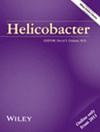Helicobacter pylori Eradication Is Associated With a Reduced Risk of Metachronous Gastric Neoplasia by Restoring Immune Function in the Gastric Mucosa
Abstract
Background
Helicobacter pylori infection is a significant contributing factor of gastric cancer. Metachronous neoplasms also pose a risk. The mechanism underlying the impact of H. pylori eradication on preventing metachronous gastric cancer is unclear. This study aimed to investigate immunity changes in gastric mucosa after H. pylori eradication and to identify mechanisms preventing metachronous recurrence.
Materials and Methods
Patients diagnosed with gastric neoplasm and H. pylori infection, who underwent endoscopic resection, were included. Thirty-six cases of metachronous neoplasms occurring after eradication (metachronous group) were compared to 36 controls matched for age, sex, atrophy, and metaplasia (control group). Histological features and immunohistochemical staining for T-cell (CD3, CD4, and CD8) and immune exhaustion (forkhead/winged helix transcription factor and programmed cell death-ligand 1) markers in the non-tumor-bearing mucosa were evaluated.
Results
In histologic features, glandular atrophy and intestinal metaplasia in the gastric mucosa significantly improved following H. pylori eradication in the control group (p < 0.001, 0.008), whereas they did not improve in the metachronous group (p = 0.449, 0.609). CD8 and CD8/CD3 ratios increased in the control group (p < 0.001, 0.04), but did not show differences in the metachronous group (p = 0.057, 0.245). The CD4/CD3 ratio and programmed cell death-ligand 1/CD4 expression significantly decreased after H. pylori eradication in the control group (p = 0.003, 0.042), but not in the metachronous group (p = 0.54, 0.55).
Conclusions
This observational study suggests that H. pylori eradication may prevent the recurrence of gastric neoplasia by improving histological inflammation and overcoming immune exhaustion.


 求助内容:
求助内容: 应助结果提醒方式:
应助结果提醒方式:


